Highs and lows in 20 years of the M6 Toll
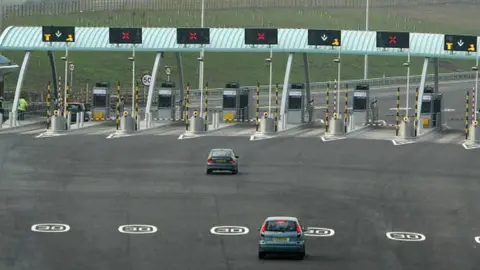 Getty Images
Getty ImagesIt cost £900m, angered environmentalists and transport campaigners alike and has led bosses to repeatedly defend it during its lifetime. As the M6 Toll turns 20, the BBC looks at the highs and lows of the past two decades.
An opening ceremony after years of controversy
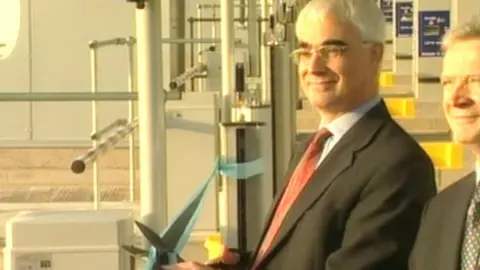
Former Transport Secretary Alistair Darling cut the ribbon on the M6 Toll on 9 December, 2003 with the barriers initially raising just after 10:00 GMT.
The initial price for the 27-mile route between Cannock and Coleshill was £3 for cars, £6 for vans and £11 for HGVs, with the first 10 million vehicles receiving a £1 discount.
The idea had been proposed 25 years earlier - with the Conservatives identifying a need to relieve congestion on the M6 back in the 1980s.
Initially known as the Birmingham Northern Relief Road (BNRR), there were objections from families and environmental groups.
A number of protest camps were set up along the route between November 1997 and January 1999, when the last one was cleared.
Scores of campaigners, many veterans of similar protests against the Newbury bypass and the second runway at Manchester airport, dug in positions at Weeford, Staffordshire.
They built a network of tunnels for their protest before they were evicted.
A mixed reception from drivers
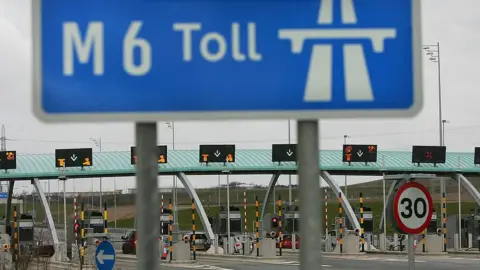 Getty Images
Getty ImagesThe route was plugged as a way of relieving pressure on the M6 to make motorists' lives easier but proved controversial from its opening.
Ten years ago, the Campaign for Better Transport said it had produced "no net benefit for drivers whilst causing huge and irreversible environmental damage".
The National Alliance Against Tolls went even further and described it as "disaster for almost everyone".
Some hauliers said they avoided it as they did not want to pay the fee and other drivers complained about the cost.
But, despite averaging fewer vehicles per day than expected - 36,000 vehicles in 2012 - Midland Expressway Limited in 2013 said it was a success.
While Dr Pat Hanlon, a senior lecturer in transport economics at the University of Birmingham, said it was too soon to brand the road a failure.
"I look at the M6 Toll as being a long-term thing. Ten years may seem a long time but roads last in our country for centuries," he said.
An e-cig drama and armed police
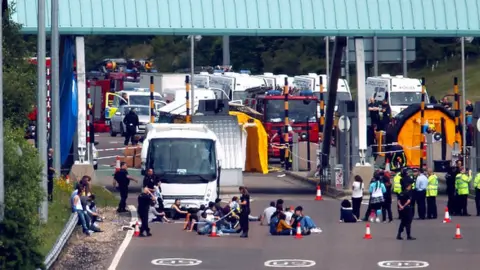 Getty Images
Getty ImagesA misunderstanding over an electronic cigarette caused a major alert on the motorway in July 2012.
Officers swooped on a coach and closed the motorway for more than four hours after receiving a report of vapour escaping from a bag.
Armed officers, troops, firefighters and bomb disposal experts all went to the scene.
Forty-eight passengers on the Megabus Preston to London service were led off the coach and forced to sit apart in a cordon on the opposite carriageway.
A decontamination unit was set up as officers searched the coach passengers one by one. The road was closed near Lichfield before police said they were no longer treating the incident as suspicious.
Takeover after years of losses
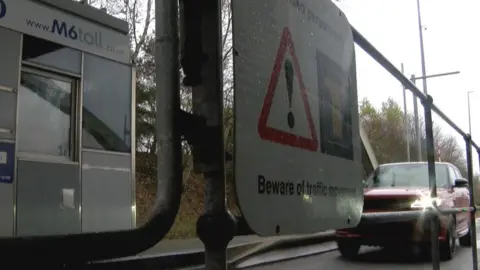
The M6 Toll was put up for sale for nearly £2bn in 2016 after a consortium of 27 banks effectively took ownership from Midlands Expressway Ltd.
Prior to this it had been losing money each year. It was taken over by investment group IFM - then owners of Manchester Airports Group, Anglian Water and Arqiva.
The National Alliance Against Tolls has argued the government should buy the motorway and remove the charge to reduce congestion.
Spokesman John McGoldrick said: "There are nearly 200,000 vehicles a day using the old M6 that's about three or four times more than the M6 Toll. That isn't right."
An award-winning service station
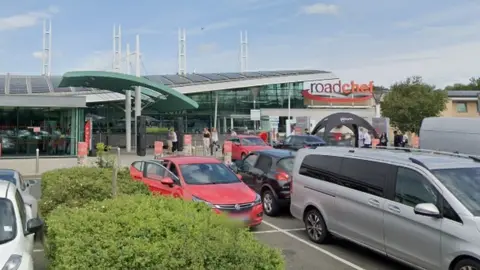 Google
GoogleThe M6 Toll's only service station - at Norton Canes - was named Best Service Station in the UK for two years running in 2018 and 2019 after surveys by transport watchdog Transport Focus.
The site scored a perfect 100% for customer satisfaction in 2018.
The service station was also voted in the top five UK service stations in a Which consumer survey this year - receiving four stars for its range and quality of shops and food outlets.
Pandemic forces changes

The pandemic triggered a sharp decrease in the number of people using the M6 Toll - from about 46,000 a day in 2019, to fewer than 26,000 in 2020.
When the road first opened, 80% of users paid with cash. Drivers could deposit coins in baskets which led to underground vaults.
But by 2019 the number of people paying with money had fallen radically and when Covid controls were introduced, a decision was made to remove them.
The tunnels are now used by maintenance engineers to get access to toll lanes so they can clean toll equipment like cameras and card payment devices.
New technology
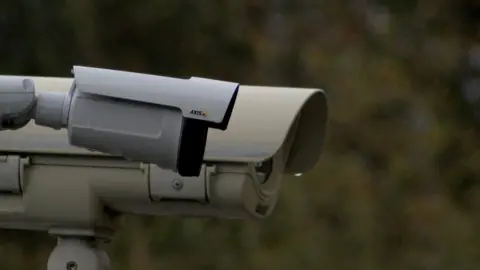
Since its opening 20 years ago, bosses say more than 300 million customers have used the M6 Toll.
They are now investing £20m to modernise it for next 20 years. Changes include new ANPR cameras which allow drivers to only pay for the section of motorway they use rather than a flat fee.
New contactless readers will also accept smartphone payments. They say the toll is now making money and provides a long-term, stable opportunity for investors.
"It's an offering of safety, reliability and a pleasant driving experience," said M6 Toll general manager Michael Whelan.
But the motorway still has its critics.
Ben Curtis, from Campaign for Better Transport, said: "The M6 Toll has done little in the way of actually reducing congestion - but has served to bring more vehicles on to the road network.
"Encouraging more drivers on to the road, when rail, bus and coach is better for the economy, the environment and the public purse can never be hailed a success."

Follow BBC West Midlands on Facebook, X and Instagram. Send your story ideas to: newsonline.westmidlands@bbc.co.uk
